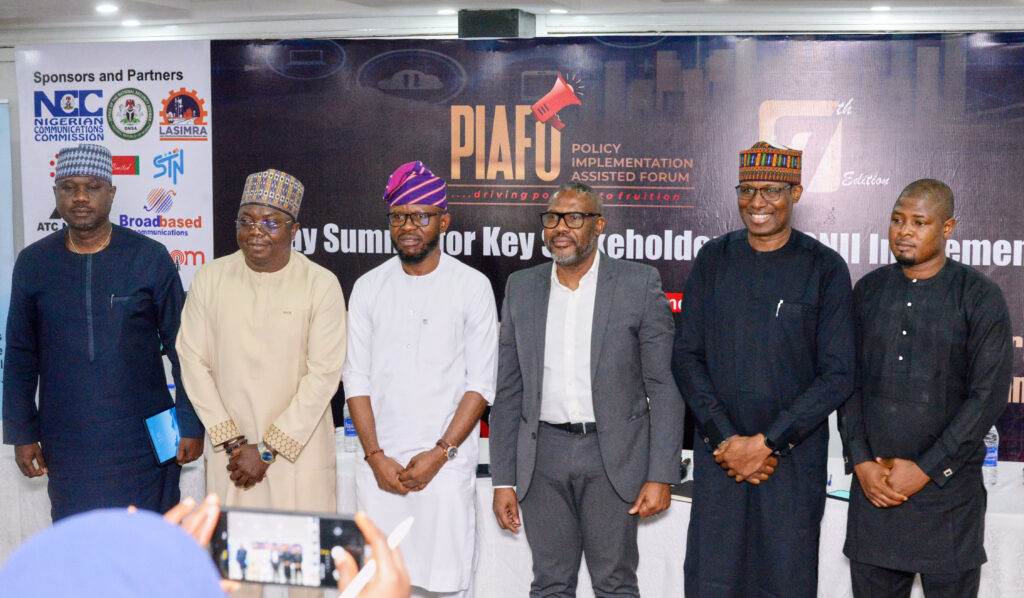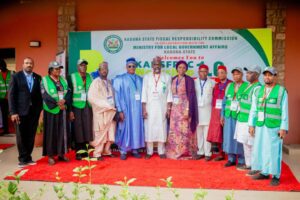Telecom Experts Urge Holistic Approach to Safeguard Infrastructure, Beyond CNII Order

L-r: Associate Director, Government Relations, IHS Nigeria, Bond Abbe; Co-founder, Infratel Africa, Dr. Tola Yusuf; Group Chief Operating Officer, WTES Projects Limited, Chidi Ajuzie; President, Association of Telecommunications Companies of Nigeria (ATCON), Tony Emoekpere; National Chairman, Association of Licensed Telecom Operators of Nigeria (ALTON); Engr. Gbenga Adebayo; and Convener, Policy Implementation Assisted Forum (PIAFo), Omobayo Azeez at the seventh edition of PIAFo on Critical National Information Infrastructure (CNII) Order Implementation held on Thursday in Lagos.
Samuel Mobolaji
Industry leaders are calling for a comprehensive strategy to protect Nigeria’s telecommunications infrastructure, emphasizing that while the Executive Order on the Designation and Protection of Critical National Information Infrastructure (CNII) is crucial, it alone will not suffice to ensure the safety of telecom investments in the country.
At the 7th Policy Implementation Assisted Forum (PIAFo) Summit in Lagos on Thursday, experts pointed to critical issues such as infrastructure vandalism, unauthorized installations, and cable theft, and proposed actionable solutions to safeguard the nation’s telecom infrastructure.
Gbenga Adebayo, Chairman of the Association of Licensed Telecommunications Operators of Nigeria (ALTON), underlined the significance of proper maintenance and installation practices. He highlighted that improper infrastructure setup, such as unsecured manhole covers and poles, often leads to vandalism and theft. “When properly installed, these components are difficult to remove. However, negligence makes them easy targets for theft,” Adebayo remarked.
He also addressed community resistance to infrastructure projects, which often delays progress. “A diesel supplier was blocked from entering an estate due to damages caused by a previous contractor. This lack of accountability breeds distrust and hinders crucial projects,” Adebayo explained, calling for better relationships with local communities to avoid such conflicts.
Adebayo further stressed the problem of unauthorized infrastructure installations, which can lead to damage during road construction projects. He urged for better coordination with government agencies to ensure proper approvals, documentation, and protection of critical infrastructure.
Tony Emoekpere, President of the Association of Telecommunications Companies of Nigeria (ATCON), echoed Adebayo’s concerns, emphasizing the need for standardization and improved coordination among stakeholders. Emoekpere pointed out that Nigeria’s infrastructure challenges extend beyond technical issues, incorporating environmental and ethical concerns. “We are dealing with a moral challenge. Theft and damage often arise due to a lack of accountability and ethical standards,” he said.
He advocated for the establishment of clear standards that all stakeholders—government, private sector, and the public—can align with, stressing that standardization is key to long-term sustainability.
Wale Owoeye, CEO of Cedarview Communications Limited, shared alarming statistics on the frequency of cable theft, noting that Airtel experiences a cable cut every six minutes. “Cable theft is a serious issue, driven by the misconception that all black cables contain valuable copper,” Owoeye explained.
To combat this, Owoeye proposed a multi-pronged approach, including community engagement, stricter enforcement, and proactive measures. He suggested creating a dedicated fund to support advocacy and awareness campaigns, committing N500,000 quarterly to kickstart the initiative. “This is like planting a seed, and with collective effort, we can grow it into a sustainable solution for protecting Nigeria’s telecom infrastructure,” he said.
The experts collectively called for a unified effort among industry players, government bodies, and local communities to enforce policies, engage stakeholders, and implement practical solutions to secure Nigeria’s telecom infrastructure and ensure the protection of telecom investments.









